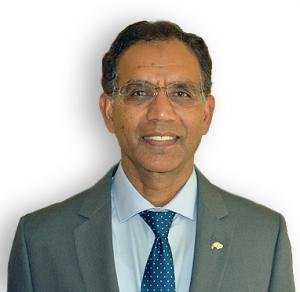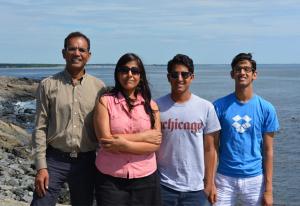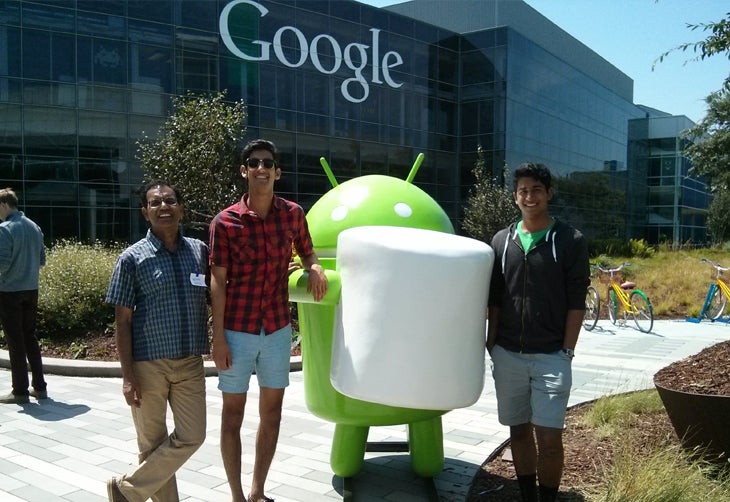Five questions for Ravinder Singh
Ravinder Singh’s journey to a top leadership post in shared governance at the University of Colorado might seem an unlikely one — if only to the CU Boulder faculty member himself.
“In all candor, when I joined the Boulder Faculty Assembly in 2005, I was ignorant of what it does,” says Singh, an associate professor in Molecular, Cellular and Developmental Biology at CU Boulder. “Over the next ten years, I became involved in various faculty governance activities. I contributed to aspects of system-level policy revisions, the Retirement Vendor Review project and the annual Regent awards.”
Singh credits his wide-ranging experience, ability to interact with stakeholders toward workable solutions, knowledge of regent laws and policies, and expertise in spearheading new policies and revisions to serving him in his role as Faculty Council chair, which he began in the fall. Previously on the council, he served as council vice chair and as chair for the committee on Educational Policy and University Standards (EPUS). “Throughout this process, I have worked with many wonderful colleagues serving the university in various roles,” he says.
“I am proud of the Faculty Council and the campus assemblies, and I appreciate faculty, staff and student contributions to shared governance. I sincerely thank the faculty for their trust in me. It brings me immense pleasure working with the board and the administration, and it is a great honor to serve the University of Colorado. Yes, ‘All Four:Colorado.’
“More perfect shared governance will require continued active participation at all levels, and mutual respect among all parties. I believe this common goal of a better University of Colorado transcends all else.
“One of the inspirations for my service is from Rabindranath Tagore, Nobel laureate, 1913:
‘I slept and dreamt that life was joy.
I awoke and saw that life was service.
I acted and behold, service was joy.’”
1. How did you first become involved with Faculty Council, and how did your participation evolve?
My path began with the Boulder Faculty Assembly in 2005. My department nominated me after I received tenure. I served at the campus-level for three years chairing the Academic Affairs committee. I joined the Faculty Council in 2008. It was then that I really began to appreciate the value of shared governance. As the executive body of the Faculty Senate, the council recommends actions that impact the entire system — academic and personnel policies, internal and external relations. It really serves as a vehicle for continuous improvement that unites all four campuses.
I started by the chairing the Educational Policy and University Standards committee. It was a wonderful opportunity to lead vetting processes of system academic policies. Perseverance was essential in guiding complex decisions to consensus, but through collaboration with our diverse faculty and administration, I was always able to steer our committee successfully and with greater understanding of each campus. I am proud of the committee’s dedication.
Other contributions strengthened my partnerships with the Board of Regents and university administration. I served on the Board of Regents Awards committee for five years and then on the Retirement Vendor Review committee, which consolidated and improved our vendor retirement plans in 2015. Most recently, I served as Faculty Council vice chair in 2015-2016.
2. How do you expect to contribute to “shared governance”?
Our university is a complex enterprise of four campuses. Smooth functioning of an enterprise of this size requires open channels for stakeholder interactions — Board of Regents, administration, and the shared governance bodies for faculty, students and staff. Stakeholders vary in professional agendas, backgrounds, cultures, personalities and missions for each of our campuses.
As Faculty Council chair, I will oversee all council committees and work closely with all stakeholders to work toward a more perfect shared governance. I believe that is critical to the mission of our university. We must govern together because: “It enriches the learning environment for our students; it leads to excellence in research, scholarship and creative work; and it enhances our service to the community, the state of Colorado and the nation.”
The collaborative relationships I have established with stakeholders enhance my ability to lead the council’s contributions to shared governance. Likewise, these collaborations provide me with framework to effectively approach matters related to university policies.
While our differences should enrich our discussions, our mutual respect and common goal to make the university a world-class institution should bind us together. We must seize the moment to not regret lost opportunities. Unity in diversity is our strength.
I have become aware that system-level contributions often go unappreciated by campus administrators and departments, quite similarly to my lack of awareness when I first joined the Boulder Faculty Assembly. Participation in shared governance is a challenge. Busy professional lives coupled with lack of immediate gain make it hard to see the value-added. In most cases, the benefits from years of hard work are not realized for some time. The Intercampus Dependent Tuition Benefit is an example. The Faculty Council advocated for improved dependent tuition benefit for several years. Just recently President Benson and campus chancellors approved a systemwide pilot program. Together, we make progress.
I do wish there were more incentives and acknowledgment available. I admire and respect all those serving on various council committees and campus assemblies. The best reward is feeling that I have served our university in a significant way.
3. What issues are high on the agenda for Faculty Council this year?
Important issues on the Faculty Council agenda include: academic freedom and freedom of expression, diversity and inclusion, dependent tuition benefits, faculty development and mentoring, governance transparency, ongoing partnership in regent laws and policies review, impact of future policy revisions on personnel time, retirement plan investments, and FCQs.
While some of the issues are unique to the faculty, others impact our staff, students or both. I look forward to working with staff and student governance leaders Denise Thomas and Marcus Fotenos. We are all in this together.
4. What is the focus of your work in Molecular, Cellular and Developmental Biology at CU Boulder?
The central dogma of biology has fascinated me since the 1980s. The flow of genetic information, simply put, is about how DNA makes RNA and RNA makes protein. I have extensive experience in RNA biology and have made seminal contributions to this field. I received my doctorate for graduate work at the Baylor College of Medicine in Houston, which involved discovery of an RNA five-prime cap structure and its unique mechanisms of synthesis; yes, RNAs wear caps and have tails, too. As a postdoctoral fellow at the University of Massachusetts Medical School in Worcester, I focused on how RNA-binding proteins turn genes on/off — i.e. regulate precursor mRNA splicing. Part of this was a wonderful collaboration with my longtime friend Dr. Juan Valcarcel.
Professors Tom Cech and Leslie Leinwand then hired me in the department of MCD Biology at CU Boulder.
I have made important scientific research contributions in the fields of RNA biology, development, gene regulation, and genome-wide high throughput analysis. One important aspect of RNA regulation is that it controls sex determination and its mis-regulation leads to ovarian tumors in Drosophila — the fruit fly. Geneticists call fruit flies “little humans with wings.” About two-thirds of the known human disease genes have been extensively studied in Drosophila. Let’s thank Thomas Hunt Morgan for capturing the white-eyed mutant fly.
More recently, I have shown unexpected functions and mechanisms for three splicing regulators — U2AF, SXL and PTB — using genetic, computational and high-throughput approaches to study gene regulation. The University of Colorado Boulder is indeed an extraordinary place to carry out RNA biology work.
5. How do you enjoy spending your time away from work?
Spending time with my family and friends is an important part of time away from work. Outdoor activities keep me entertained. I routinely spend my weekends biking, jogging and doing yoga. I love to hike and camp over the summer. In the winter, you can find me driving my sons to the ski slopes.
I am avid reader of different genera. Some of my favorites and why:
- “The Intelligent Investor” by Benjamin Graham — helped my contributions to the Retirement Vendor Review committee.
- “A Brief History of Time” by Stephen Hawking, “Relativity” by Albert Einstein and “The God Particle” by Leon Lederman — constant reminders about the rigor of science.
- “The Story of My Experiments With Truth” by Mahatma Gandhi, “The 7 Habits of Highly Effective People” by Stephen Covey, “Who Moved My Cheese” by Spencer Johnson and “How to Win Friends and Influence People” by Dale Carnegie — each shaped my abilities to interact with and learn from diverse people.
When I need a break, Hollywood and Bollywood films and television provide necessary entertainment for my entire family. My sons keep me up to date — we watch “The Office,” “Parks and Recreation” and the film “The Big Short.” A few of my personal favorites: “Sholay,” “3 Idiots,” “Guess Who’s Coming to Dinner,” “Harry Potter,” “Star Wars” and “Charlie Rose.”




